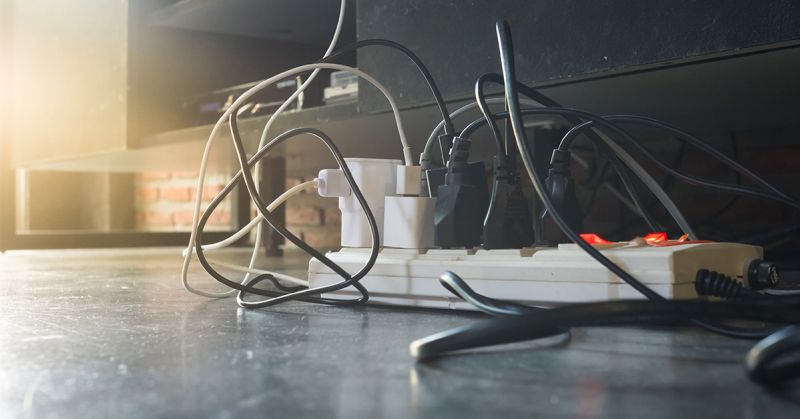
Tallahassee Electricians Detail Dangers of Overloading a Circuit
If you periodically review the Tallahassee Fire Department’s (TFD) public safety news releases, you’ll often find that when a report details its response to a structural fire, the cause “often appears to be electrical.” A case in point being its January 16th response to two fires within 12 hours, with the cause of both cited as appearing to be electrical.
TFD news releases sometimes conclude with tips to help reduce the risk of electrical fires. Among these tips are to “avoid overloading electrical outlets and power strips.” Or, as the technicians at Meeks Electrical Services in Tallahassee would say, “Don’t overload electrical circuits.” Overloading a circuit can cause an electrical fire, but it causes other problems, too. Let’s further examine how circuits get overloaded, the signs of circuit overloading, what dangers they pose, and how to resolve related circuitry problems.
Electric Circuit Basics
An electric circuit is a dedicated pathway through which electricity flows from a primary power source to the implements using the electricity. In homes and commercial buildings, an electric circuit typically consists of wires, conductors, switches, outlets, and a circuit breaker linked to a distribution panel, which receives electricity from Tallahassee Utilities. Circuits are designed to deliver dedicated power loads to specific areas or devices. Some circuits provide power to a particular room, while others power a single appliance or other high-load equipment.
What is an Overloaded Circuit?
A circuit becomes overloaded when electrical demand exceeds its ability to transmit the energy safely. Circuits have variable allowable loads based on wire type and gauge, circuit breaker rating, distribution panel capacity, and other factors. The dedicated circuit that powers your washer/dryer or other high-load appliance is not designed to provide additional power to other devices. Thus, the electric pathway for such circuits tends to service a single dedicated outlet.
A circuit serving a distinct area can generally handle its lighting and other electronics plugged into the outlets but with limits depending on the circuit’s load. This explains why TFD’s tip emphasizes overloading outlets and power strips. While a power strip may allow you to plug multiple electrical devices into an outlet, it will not boost the available power load from the outlet’s specific circuit. Thus, power strips tend to increase the likelihood of causing circuit overload.
What Problems Can an Overloaded Circuit Cause?
As suggested by the TFD, many fires that “appear to be electrical” were caused by an overloaded circuit. When a circuit becomes overloaded, the increased electrical resistance can cause wires and other circuit components to overheat, sometimes to the point of starting a fire. And the risk of a fire caused by overload significantly increases when the circuit’s wiring and other electrical components are old or damaged. Other overloaded circuit dangers include:
- Damage to Electrical System—Even if the heat generated by an overloaded circuit doesn’t cause a fire, it can damage the wiring, insulation, switches, and other circuitry components. Given time, the damage will necessitate costly repairs or replacement of the damaged materials.
- Damage to Devices and Appliances—overloaded circuits often cause voltage spikes and fluctuations, which can harm the electrical components of computers, TVs, appliances, and other equipment plugged into the circuit. Such voltage fluctuations also degrade the electrical system.
- Electrical Shock—the excessive increase in current through an overloaded circuit can cause short circuits and arcing, which increases the risk of electrical shock. The risk is most acute with older wiring and other circuit components.
- Localized Power Outages—if your circuit works as safely designed, an overload will cause the circuit to break or the fuse to blow. Safety-wise, this is a positive result, but it causes a power outage that will likely be annoying at best. After resetting the circuit breaker or replacing the fuse, such outages will continue until you relieve the circuit’s load.
Signs of a Circuit Overload
Because an overloaded circuit is under stress, it often causes noticeable symptoms, including the following:
- Frequent circuit breaks or fuse failures.
- Lighting that flickers or dims, especially when other devices on the circuit are turned on.
- Buzzing, crackling, or other strange noises that emanate from outlets or light switches.
- Outlets or light switches that are warm to the touch or display discoloration over time (browning or blackening is a sign of overheating).
- Noticeable declines in appliance efficiency, such as an air conditioner or refrigerator that isn’t properly cooling.
- A burning odor characterized as “electrical” or with the smell of burning plastic. This symptom requires immediate attention by reducing or eliminating the circuit’s load and contacting a professional electrician.
How to Resolve Overloaded Circuit Dangers
For longer-term fixes Spread the circuit’s load by avoiding plugging too many devices into one outlet. For example, do not plug two high-wattage kitchen tools, like an air fryer and microwave, into the same outlet. Other ways to ease a circuit’s load include:
- Only use power strips with built-in overload protectors.
- Use energy-efficient devices.
- Make a habit of unplugging electrical devices and equipment that are not being used.
- Learn about electrical load capacity and how much power each of your circuits can handle (your Tallahassee electrician can help you understand this).
- Consider an electrical system upgrade with Tallahassee’s Meeks Electrical Services.
Prevent Circuit Overloads with Tallahassee’s Meeks Electrical
If your home or business is experiencing problems with circuit overloads in the Tallahassee area, contact the professional electricians at Meeks. We can diagnose and resolve the issue to ensure your electrical needs are safely met. Contact us at (850) 575-5241 for all your residential or business electrical needs.